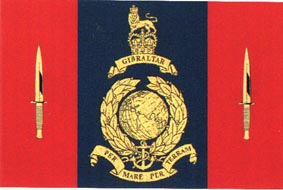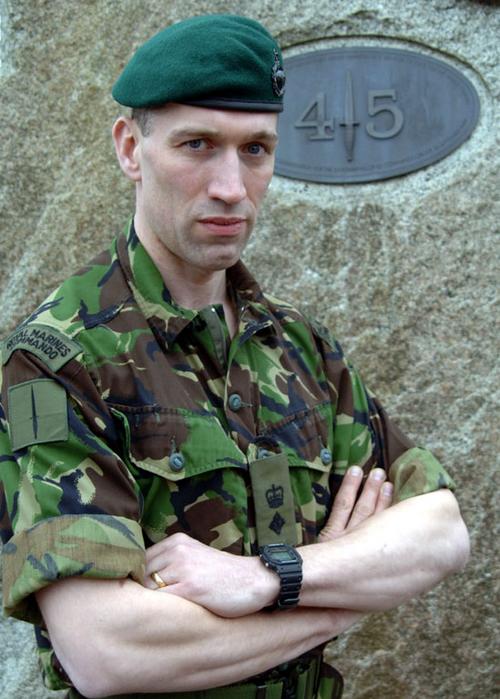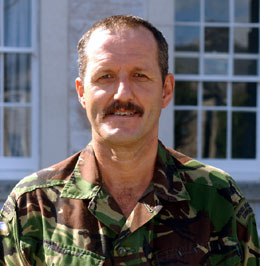45 Commando RM
45 Commando Royal Marines is based at Royal Marines Condor in Arbroath, Scotland. It is one of three Commando Units that provide the cutting edge to 3 Commando Brigade Royal Marines.
The unit is trained and equipped for a wide range of operational tasks and regularly deploys to the most taxing of environments from tropical rain forest to arid desert, mountains or the cold of the arctic. 45 Commando was the first unit to specialise in the mountain and cold weather warfare role during the early 1970s.
History
45 Commando Royal Marines was formed in August 1943, and played its part to the full throughout the remainder of World War II. This included the D-Day landings in Normandy, the subsequent fighting through Holland and thereafter the crossings of the Rhine, Weser and Elbe rivers.
The post-war years saw no let up, the Commando deployed on operations to Palestine, Suez (where it performed the first ever, operational helicopter assault in 1956), Malaya, Aden and Cyprus. The Commando finally returned to the UK in 1967 after 24 years operational service abroad and moved to its current base in Arbroath in 1971.
Throughout the 1970s at the height of the Cold War, the Commando honed its new mountain and cold weather warfare skills for its role to defending Norway and NATO's northern flank. Amphibious exercises north of the Arctic Circle were interspersed throughout the 70s and 80s with operational tours of duty in Northern Ireland.
In 1982, the Commando demonstrated its amphibious expertise, when as part of 3 Commando Brigade, it took part in Operation Corporate, the recapture of the Falkland Islands. 45 Commando 'yomped' across the island of East Falkland and successfully defeated Argentine forces in the crucial battle for Two Sisters.
In the post-Cold War era of the 1990s the unit saw no reduction in operational tempo. In 1991 it deployed to Northern Iraq on a humanitarian assistance mission to provide a safe haven for the Kurdish people, and in 1994 it was dispatched to reinforce the Kuwaiti border against renewed Iraqi aggression.
In 1998 whilst exercising in the Caribbean with HMS Ocean, the Royal Navy's new helicopter carrier, the unit was on hand to provide life saving assistance to the population and to help in repairing the infrastructure after Hurricane Mitch devastated Nicaragua and Honduras. The subsequent television and media coverage of the operation demonstrated once more the flexibility and utility of an amphibious force that was able to react quickly and effectively. In recognition of this action, the Wilkinson Sword of Peace was awarded jointly to the Commando and the ship.
The trend towards deployability and wider utility has been carried forward into the new millennium. In 2000 the unit deployed to Belize to conduct jungle environmental training, returning briefly to the UK prior to undertaking a six-month operational tour in support of the United Nations Mission in Kosovo. The Unit returned in March 2001 and has since reorganised into the Commando 21 order of battle with 4 manoeuvre companies (W, X, Y, Z), Command and Logistic companies.
In March 2002 the Unit renewed its relationship with HMS Ocean providing the Landing Force component of Amphibious Ready Group (ARG). It was from this platform that the Commando deployed into Afghanistan to conduct war-fighting operations on OP JACANA in support of the War against Terrorism. In the first land warfare operations of this type since the Falklands, the Unit moved through eastern Afghanistan to the border with Pakistan, denying territory to Al Qaeda and simultaneously destroying their infrastructure and weapon caches. The Commando recovered to RM Condor in July of the same year.
In early 2003 Parliament announced the deployment of 3 Cdo Bde to Op Telic with the objective of ridding Saddam Hussein's regime of its weapons of mass destruction. Although the unit did not deploy as a Commando Group, about 487 members deployed on operations all told. The tasking of the companies that deployed varied tremendously contributing significantly to the swift success of the Coalition forces.
COMMANDING OFFICER
On completion of his Bachelor of Science (Honours) degree in Aeronautics and Astronautics at Southampton University, Lieutenant Colonel Duncan Dewar initially served for three years with the Royal Navy before transferring to the Royal Marines in May 1991. After attending RM Young Officer training, he joined 40 Commando RM as a troop commander during which time he completed an operational tour in West Belfast and a number of UK exercises and overseas deployments, notably to Norway and Kuwait.
Following a brief spell as Unit Training Officer, Lieutenant Colonel Dewar attended the Junior Command and Staff Course at Camberley during 1995. On conclusion of JCSC, a quick foray into the Directorate of Naval manpower to conduct a study preceded a return to 40 Commando RM as Adjutant and a second tour of Northern Ireland.
Completing an appointment as Officer Commanding the Junior Command Course at the Commando Training Centre during 1997, Lieutenant Colonel Dewar then embarked on advanced staff training. Initially attending the Defence Technology Course (Master of Arts) at the Royal Military College of Science and subsequently the Advanced Command and Staff Course at the Joint Services Command and Staff College. Following these courses, he completed two years as a staff officer in the J3 Division of the Permanent Joint Headquarters at Northwood, where he was involved in planning and deploying UK forces on numerous operations, in particular to East Timor, Mozambique and Sierra Leone.
Returning to command, Lieutenant Colonel Dewar then completed a two-year tour as Officer Commanding C Company, once again in 40 Commando RM, during which he deployed operationally to both Afghanistan and Iraq. On completion of his command tour, he was employed on the staff of the Joint Doctrine and Concepts Centre working within the concepts area and subsequently within the Fleet Headquarters Programming Office, with responsibility for deployments and contingencies.
Lieutenant Colonel Dewar assumed command of 45 Commando Royal Marines on 5 April 2006.
WO1 (RSM)
WO1 (RSM) Colin Hearn was born in Exeter, Devon. He joined the Royal Marines in 1984 and on completion of training joined 42 Commando as a rifleman in Lima Company. The highlights included operational tours in Northern Ireland and cold weather training deployments in Norway.
In 1986 he joined HMS Battleaxe serving with the Royal Marine detachment. During 1988 on completion of a six-month Armilla patrol in the Gulf he attended and successfully passed the Junior Command Course. He was promoted to Corporal in 1988 and returned to 42 Commando as a section Commander until 1990 when he attended the Mountain Leader Course, on passing out in 1991 he served with the Mountain and Arctic Warfare Cadre, this tour included an operational deployment to Northern Iraq on Op Haven.
During 1993 he attended and successfully passed a Senior Command Course followed soon after with a Mountain Leader Class One course where on completion he took up his first appointment as Troop Sergeant in 40 Commando and after 18 months moving onto Recce Troop. A busy period with a further tour of Northern Ireland, a Jungle Warfare Instructors Course, Exercise Curry trail in Brunei and a five month tour to South Georgia as the Mountain Warfare advisor to the Army detachment. During 1998 he returned to Plymouth as the Mountain Leader Class Two Course Sergeant Major, responsible for the training and managing of young Mountain Leaders.
Promoted to Colour Sergeant in May 1999, he spent two years as an exchange instructor with the United States Marine Corps Mountain Training School at Pickle Meadows in California. During this time he returned to the United Kingdom and successfully passed the Advanced Command Course.
August 2001 saw him appointed to the Commando Logistic Regiment as Squadron Sergeant Major of Medical Squadron, following this, to Commando Training Centre as Command Wing Sgt Major responsible for all Command Training including young Officer Training. In 2003 he moved to the United Kingdom Command Support Group as Support Squadron Brigade Recce Force Sergeant Major, deploying on Exercise Royal Chamois in Slovenia and the Winter Deployment 2004.
In March 2004 he successfully completed his Regimental Sergeant Major Board and was appointed to One Assault Group in November 2004. He was appointed to 45 Commando in August 2005.
Colin lives in Plymouth Devon and is married to Debbie he has a daughter, Jessica who is 14 and a son, Joseph who is 12. His interests include the Outdoors and he enjoys golf, skiing and walking.


